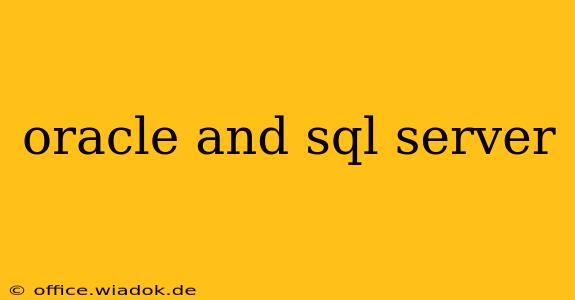Choosing the right database management system (DBMS) is crucial for any organization, impacting performance, scalability, and overall efficiency. Oracle and SQL Server are two industry giants, each boasting a powerful feature set and a vast user base. This in-depth comparison will help you understand the key differences between Oracle and SQL Server, allowing you to make an informed decision for your specific needs.
Key Differences: A Head-to-Head Comparison
Both Oracle and SQL Server are relational database management systems (RDBMS), adhering to the ACID properties (Atomicity, Consistency, Isolation, Durability) ensuring data integrity. However, significant differences exist in their architecture, features, and overall approach.
1. Cost and Licensing:
-
Oracle: Generally considered more expensive, particularly for large deployments. Oracle's licensing model is complex, often involving per-processor, per-core, or named-user licensing, leading to potentially high costs. Maintenance and support fees also contribute to the overall expenditure.
-
SQL Server: Offers a more flexible licensing model, with options ranging from per-core licensing to enterprise agreements. This makes SQL Server potentially more cost-effective, especially for smaller organizations or those with fluctuating needs. Microsoft's cloud-based offerings (Azure SQL Database) further enhance cost optimization through pay-as-you-go models.
2. Performance and Scalability:
-
Oracle: Renowned for its exceptional performance and scalability, particularly in handling massive datasets and high-transaction volumes. Oracle's advanced features, such as its powerful query optimizer and parallel processing capabilities, contribute to its performance edge. Oracle RAC (Real Application Clusters) provides high availability and scalability across multiple servers.
-
SQL Server: Offers robust performance and scalability, though generally considered slightly less performant than Oracle for extremely large datasets and complex queries. However, SQL Server's performance has steadily improved over the years, and with proper optimization, it can handle significant workloads effectively. SQL Server's AlwaysOn Availability Groups provide high availability and disaster recovery capabilities.
3. Features and Functionality:
Both systems offer a comprehensive set of features, including:
- Data warehousing: Both provide robust tools for building and managing data warehouses.
- Data security: Both offer sophisticated security features to protect sensitive data.
- High availability: Both provide mechanisms for high availability and disaster recovery.
- Integration: Both integrate well with other enterprise applications and technologies.
However, subtle differences exist:
- Oracle's Advanced Features: Oracle boasts more advanced features in areas like data mining, advanced analytics, and spatial data handling.
- SQL Server's Integration with Microsoft Ecosystem: SQL Server integrates seamlessly with other Microsoft products, such as .NET, SharePoint, and Azure, offering a significant advantage for organizations heavily invested in the Microsoft ecosystem.
4. Development Tools and Community Support:
-
Oracle: Provides a comprehensive suite of development tools, but the learning curve can be steeper than SQL Server's. The Oracle community, while large, is arguably less active and readily accessible than SQL Server's.
-
SQL Server: Offers user-friendly development tools and extensive documentation, making it easier for developers to learn and use. The SQL Server community is vibrant and provides ample resources, tutorials, and support.
5. Cloud Deployment:
-
Oracle: Offers Oracle Cloud Infrastructure (OCI), providing a cloud platform for deploying and managing Oracle databases.
-
SQL Server: Seamlessly integrates with Microsoft Azure, offering various deployment options, including Azure SQL Database, Azure SQL Managed Instance, and Azure SQL Database Hyperscale. This tight integration with Azure provides a compelling advantage for organizations using Microsoft's cloud services.
Choosing the Right DBMS: Factors to Consider
The best choice between Oracle and SQL Server depends on several factors:
- Budget: SQL Server generally offers more cost-effective licensing options.
- Scale and performance requirements: For extremely large datasets and high transaction volumes, Oracle might be the better choice, but SQL Server is suitable for many enterprise needs.
- Existing infrastructure and expertise: Organizations heavily invested in the Microsoft ecosystem might find SQL Server a more natural fit.
- Specific feature requirements: Certain advanced features may only be available in Oracle.
This comparison provides a detailed overview of the key differences between Oracle and SQL Server. Carefully evaluating your specific requirements and constraints is crucial to making the optimal choice for your organization's database needs. Remember to consult with database experts to determine which system best aligns with your long-term strategy and goals.

